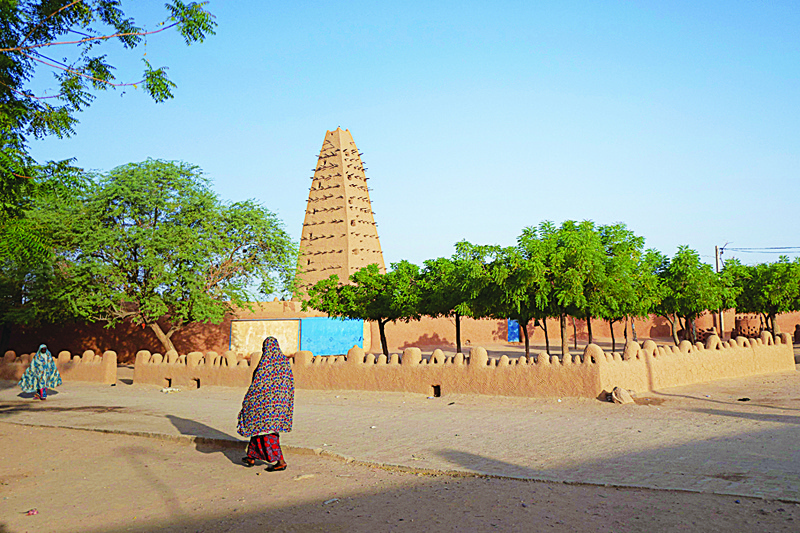 AGADEZ, Niger: A woman is seen walking in the old city of Agadez. Air Info and Sahara.fm represents today the main source of information on the Nigerien Sahara. - AFP
AGADEZ, Niger: A woman is seen walking in the old city of Agadez. Air Info and Sahara.fm represents today the main source of information on the Nigerien Sahara. - AFPAGADEZ: From the outside, it doesn't look like much: a two-storey building with a logo in the dusty streets of Agadez in northern Niger. But there has been plenty happening inside the building at Air Info-an ambitious media outlet that has been breaking exclusives in the Sahara Desert. A vast, sparsely-populated region, northern Niger is plagued by drugs and weapons trafficking, migration and violence by armed groups.
In 2002, Ibrahim Manzo Diallo, a young school teacher posted to the troubled region, was struck by the lack of media coverage. There was no outlet providing "news of the far north," he told AFP. Using a newly-installed printing press in Agadez, Diallo launched a monthly publication, funding it from his meagre teaching salary.
Today, Air Info has 13 full-time employees and in addition to the newspaper-whose rate of publication varies-boasts a popular website and Sahara FM, one of Agadez's main radio stations bought in 2013. For those needing news on northern Niger, a crossroads between North and sub-Saharan Africa, Air Info is now the go-to source. "We no longer go looking for scoops, they come to us," Diallo said with a smile.
Threats and jail
One of Air Info's exclusives was video footage it published last year of two Italians being held hostage by Al-Qaeda jihadists, the first proof they were alive after several years in detention. An Italian television station offered to buy the footage, but Diallo refused. As always, everyone wanted to know his sources. "The only thing that protects us is honesty and seriousness," he said. "Our sources know that we will never reveal who is talking to us."
An early scoop came during the abduction of several French citizens in 2010. Air Info was "one of the very first" to get witnesses to talk, Diallo says, adding that the story "helped establish our credibility". But behind the man with a broad smile, wearing a boubou robe and eating braised mutton on the windy terrace of his organization's headquarters, there is a journalist caught between the forces of national security and jihadist expansion.
He said he "gets calls from everywhere" from "people ready to give us money to keep quiet about information." He published the video about the Italian hostage without batting an eyelid. No one knows who gave it to him. But the freedom to publish predictably comes at a price-threats and sometimes jail. In 2007 Air Info was forced to close for three months and Diallo was imprisoned for four months after being accused of links to a rebellion by ethnic Tuaregs that was raging at the time.
Diallo said it was because earlier that year Air Info published a story under the headline "Drama in Tizirzet" about the discovery of "civilians beheaded by those who were supposed to protect them". "I was sure it was going to cost me dearly," he said. But despite his time in prison-and that all copies of the newspaper were suspiciously bought up after only being on a sale a few hours-he said it remains the scoop he is most proud of.
'Hello Agadez!'
On the floor below the paper's newsroom, the sounds of Sahara FM echo as the presenters take turns in the single studio. The programming is lighter fare than the newspaper, favoring practical information for locals. For example, mayors call the station so it can warn people living near rivers about a coming flood, Diallo says.
Every morning, Salah Safo presents his "Hello Agadez!" program in the Hausa language for 350,000 listeners, according to the station's figures. "People call in to make dedications to their friends, it's a really popular show," Safo said. After Safo is done, the next host takes over in the Tuareg language Tamashek, as the station moves through the many languages of the region. Air Info's slender finances were hit by the COVID-19 pandemic but Diallo has his sights set on the future. "We are now thinking of going into television," he said. - AFP









